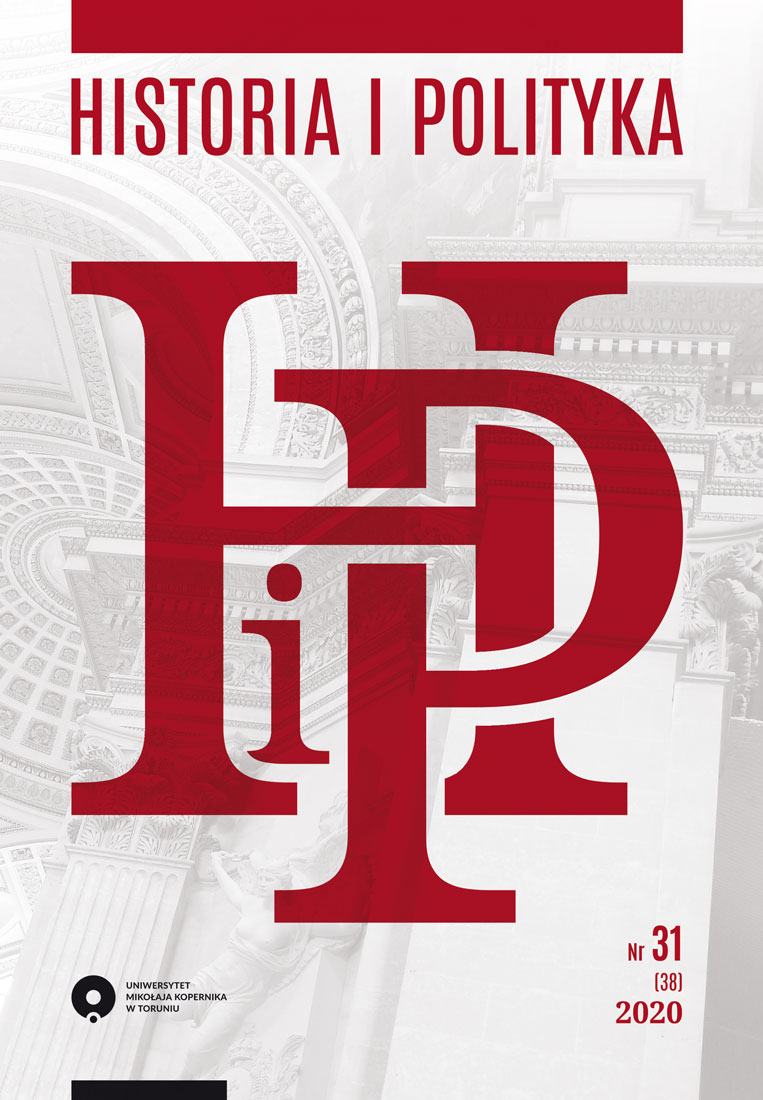Postrzeganie kobiet w Korei Południowej przez pryzmat okupacji japońskiej w latach 1910–1945 – zderzenie konfucjańskiego porządku społecznego z sytuacją comfort women
DOI:
https://doi.org/10.12775/HiP.2020.002Słowa kluczowe
comfort women, okupacja japońska, przemoc wobec kobiet, konfucjanizm a kobieta, prawa kobietAbstrakt
The social situation of women in contemporary South Korea should be considered through the prism of various events taking place in the past on the Korean Peninsula. Although the state is modern, there is still no full equality between the sexes, and the women are perceived as subordinate to men. The reason of status quo is worth considering. Certainly one of the factors that had significant impact on this phenomenon was the comfort women social situation during World War II and thus during the 1910–1945 Japanese occupation in Korea and after its end. The aim of the article is to show the relationship between comfort women and contemporary perception of women in South Korea. Surely not only comfort women situation but also Confucianism has had an influence on Korean society.
Bibliografia
Drea, E. (2008). Researching Japanese War Crimes Records. Washington: Introductory Essays.
Goban-Klas, T. (2006). Historia i współczesność Korei: od pustelniczego królestwa do azjatyckiego tygrys. Toruń: Wydawnictwo Adam Marszałek.
Howard, K. (2000). True Stories of the Korean Comfort Women: Testimonies. New York: Cassell Global Issue Series.
Kang, J. (2003). The Land of Scholars. Two Thousand Years of Korean Confucianism. New Jersey: Homa and Sekey Books.
Kim, C. (2001). Confucianism and Korean Thoughts. Seoul: Hollym.
Kim, J. (2013). Korean Philosophy. Korean Confucianism, Korean Philosphers, Joeson Dynasty Politics. Seul: Hollym International Corporation.
Mason, D. (2013). An Encyclopedia of Korean Buddhism. Seul: Unjusa Publishers.
Nahm, A.C. (1996). Korea: Tradition and Transformation. A History of the Korean People. Seul: Hollym International Corporation.
Northeast Asian History Foundation. (2007). The Truth of the Japanese Military “Comfort Women”. Seul: Northeast Asian History Foundation.
Ogarek-Czoj, H. (2001). Być kobietą w Korei. Wierne żony, troskliwe matki, piękne kurtyzany. W: D. Chmielowska, B. Grabowska, E. Machut-Mendecka (red.). Być kobietą w Oriencie. Warszawa: Wydawnictwo Dialog.
Park, Y. (2005). Comfort Women of the Empire. Soul: Hollym International Corporation.
Pratt, K. (2007). Everlasting Flower. A History of Korea. London: Reaktion Books.
Rurarz, J. (2005). Historia Korei. Warszawa: Wydawnictwo Akademickie Dialog.
Schellstede, S.C.,Yo, S.M. (2000). Comfort Women Speak. Testimony by Sex Slaves of the Japanese Military. Includes New United Nations Human Rights Report. New York: Holmes and Meier Publishing.
Schmidt, D. (2000). Ianfu, the Comfort Women of the Japanese Imperial Army of the Pacific War. Broken Silence. New York: Edwin Meller Pr.
Soh, S.C. (2008). The Comfort Women. Sexual Violence and Postcolonial Memory in Korea and Japan. Chicago: University of Chicago Press.
Watanabe, K. (1995). Trafficking in Women’s Bodies, Then and Now. The Issue of Military “Comfort Women”. New York: The Feminist Press at the City University of New York.
Pobrania
Opublikowane
Jak cytować
Numer
Dział
Licencja
Uniwersytet Mikołaja Kopernika w Toruniu respektuje prawo do prywatności i ochrony danych osobowych autorów.
Dane autorów nie są wykorzystywane w celach handlowych i marketingowych. Redaktorzy i recenzenci są zobowiązani do zachowania w poufności wszelkich informacji związanych ze złożonymi do redakcji tekstami.
Autor, zgłaszając swój tekst wyraża zgodę na wszystkie warunki i zapisy umowy licencyjnej (określającej prawa autorskie) z Uniwersytetem Mikołaja Kopernika w Toruniu.
Statystyki
Liczba wyświetleń i pobrań: 5219
Liczba cytowań: 0



